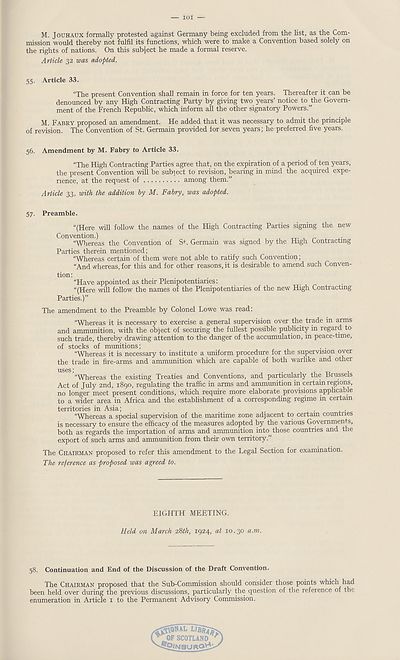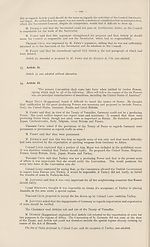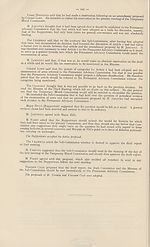Armament > Conference for the control of the international trade in arms, munitions and implements of war
(103)
Download files
Complete book:
Individual page:
Thumbnail gallery: Grid view | List view

M. Jouhaux formally protested against Germany being excluded from the list, as the Com¬
mission would thereby not fulfil its functions, which were to make a Convention based solely on
the rights of nations. On this subject he made a formal reserve.
Article 32 was adopted.
55. Article 33.
“The present Convention shall remain in force for ten years. Thereafter it can be
denounced by any High Contracting Party by giving two years’ notice to the Govern¬
ment of the French Republic, which inform all the other signatory Powers.”
M. Fabry proposed an amendment. He added that it was necessary to admit the principle
of revision. The Convention of St. Germain provided for seven years; he preferred five years.
56. Amendment by M. Fabry to Article 33.
“The High Contracting Parties agree that, on the expiration of a period of ten years,
the present Convention will be subject to revision, bearing in mind the acquired expe¬
rience, at the request of among them.”
Article 33, with the addition by M. Fabry, was adopted.
57. Preamble.
“(Here will follow the names of the High Contracting Parties signing the new
Convention.)
“Whereas the Convention of SC Germain was signed by the Hign Contracting
Parties therein mentioned;
“Whereas certain of them were not able to ratify such Convention;
“And whereas, for this and for other reasons, it is desirable to amend such Conven¬
tion:
“Have appointed as their Plenipotentiaries:
“(Here will follow the names of the Plenipotentiaries of the new High Contracting
Parties.)”
The amendment to the Preamble by Colonel Lowe was read:
“Whereas it is necessary to exercise a general supervision over the trade in arms
and ammunition, with the object of securing the fullest possible publicity in regard to
such trade, thereby drawing attention to the danger of the accumulation, in peace-time,
of stocks of munitions;
“Whereas it is necessary to institute a uniform procedure for the supervision over
the trade in fire-arms and ammunition which are capable of both warlike and other
uses *
^ ' “Whereas the existing Treaties and Conventions, and particularly the Brussels
Act of July 2nd, 1890, regulating the traffic in arms and ammunition in certain regions,
no longer meet present conditions, which require more elaborate provisions applicable
to a wider area in Africa and the establishment of a corresponding regime in certain
territories in Asia; . .
“Whereas a special supervision of the maritime zone adjacent to certain countries
is necessary to ensure the efficacy of the measures adopted by the various Governments,
both as regards the importation of arms and ammunition into those countries and the
export of such arms and ammunition from their own territory.”
The Chairman proposed to refer this amendment to the Legal Section for examination.
The reference as proposed was agreed to.
EIGHTH MEETING.
Held on March 2M1, 1924, at 10.30 a.m.
58. Continuation and End of the Discussion of the Draft Convention.
The Chairman proposed that the Sub-Commission should consider those points which had
been held over during the previous discussions, particularly the question of the reference of the
enumeration in Article 1 to the Permanent Advisory Commission,
mission would thereby not fulfil its functions, which were to make a Convention based solely on
the rights of nations. On this subject he made a formal reserve.
Article 32 was adopted.
55. Article 33.
“The present Convention shall remain in force for ten years. Thereafter it can be
denounced by any High Contracting Party by giving two years’ notice to the Govern¬
ment of the French Republic, which inform all the other signatory Powers.”
M. Fabry proposed an amendment. He added that it was necessary to admit the principle
of revision. The Convention of St. Germain provided for seven years; he preferred five years.
56. Amendment by M. Fabry to Article 33.
“The High Contracting Parties agree that, on the expiration of a period of ten years,
the present Convention will be subject to revision, bearing in mind the acquired expe¬
rience, at the request of among them.”
Article 33, with the addition by M. Fabry, was adopted.
57. Preamble.
“(Here will follow the names of the High Contracting Parties signing the new
Convention.)
“Whereas the Convention of SC Germain was signed by the Hign Contracting
Parties therein mentioned;
“Whereas certain of them were not able to ratify such Convention;
“And whereas, for this and for other reasons, it is desirable to amend such Conven¬
tion:
“Have appointed as their Plenipotentiaries:
“(Here will follow the names of the Plenipotentiaries of the new High Contracting
Parties.)”
The amendment to the Preamble by Colonel Lowe was read:
“Whereas it is necessary to exercise a general supervision over the trade in arms
and ammunition, with the object of securing the fullest possible publicity in regard to
such trade, thereby drawing attention to the danger of the accumulation, in peace-time,
of stocks of munitions;
“Whereas it is necessary to institute a uniform procedure for the supervision over
the trade in fire-arms and ammunition which are capable of both warlike and other
uses *
^ ' “Whereas the existing Treaties and Conventions, and particularly the Brussels
Act of July 2nd, 1890, regulating the traffic in arms and ammunition in certain regions,
no longer meet present conditions, which require more elaborate provisions applicable
to a wider area in Africa and the establishment of a corresponding regime in certain
territories in Asia; . .
“Whereas a special supervision of the maritime zone adjacent to certain countries
is necessary to ensure the efficacy of the measures adopted by the various Governments,
both as regards the importation of arms and ammunition into those countries and the
export of such arms and ammunition from their own territory.”
The Chairman proposed to refer this amendment to the Legal Section for examination.
The reference as proposed was agreed to.
EIGHTH MEETING.
Held on March 2M1, 1924, at 10.30 a.m.
58. Continuation and End of the Discussion of the Draft Convention.
The Chairman proposed that the Sub-Commission should consider those points which had
been held over during the previous discussions, particularly the question of the reference of the
enumeration in Article 1 to the Permanent Advisory Commission,
Set display mode to:
![]() Universal Viewer |
Universal Viewer | ![]() Mirador |
Large image | Transcription
Mirador |
Large image | Transcription
Images and transcriptions on this page, including medium image downloads, may be used under the Creative Commons Attribution 4.0 International Licence unless otherwise stated. ![]()
| League of Nations > Armament > Conference for the control of the international trade in arms, munitions and implements of war > (103) |
|---|
| Permanent URL | https://digital.nls.uk/195383102 |
|---|
| Shelfmark | LN.IX |
|---|
| Description | Over 1,200 documents from the non-political organs of the League of Nations that dealt with health, disarmament, economic and financial matters for the duration of the League (1919-1945). Also online are statistical bulletins, essential facts, and an overview of the League by the first Secretary General, Sir Eric Drummond. These items are part of the Official Publications collection at the National Library of Scotland. |
|---|---|
| Additional NLS resources: |
|

